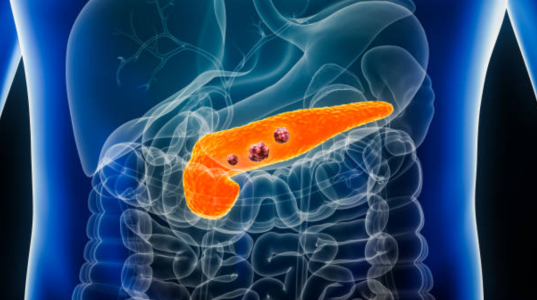This Mum of Two Thought It Was Just a Food Intolerance—Now She's Warning Others About the Deadly Mistake
By
- Replies 3
In a world where we're increasingly aware of the importance of a healthy lifestyle, it's easy to attribute minor health issues to diet or stress. But what happens when these seemingly innocuous symptoms mask a more sinister condition? This was the tragic case of Emma King, a 43-year-old mother and fitness enthusiast, whose life was cut short by pancreatic cancer after her symptoms were initially mistaken for food intolerance.
Emma, from Maidstone, was a familiar face at her local running clubs and sports classes, embodying an active and healthy lifestyle. However, in 2017, she began to experience persistent digestive issues and stomach problems. Like many of us, she sought advice from her GP, expecting a simple explanation. The symptoms were thought to be due to food intolerances or irritable bowel syndrome (IBS), and Emma was advised to keep a food diary to identify potential triggers.
Her sister, Hayley Penfold, recalls the frustrating journey of misdiagnosis, 'She was back and forth to the doctors who told her to keep a food diary and put it down to multiple food intolerances, IBS symptoms, and wheat sensitivity.' Despite these efforts, Emma's condition did not improve, and she began to lose weight—a classic red flag for cancer that, unfortunately, was not immediately recognised.
It wasn't until two years later, in August 2019, that Emma was finally sent for a scan. The results were heart-wrenching: a mass on her pancreas, which was confirmed to be cancer that had already metastasised to her liver. Pancreatic cancer is notoriously difficult to diagnose early due to its subtle and often vague symptoms. By the time it is detected, it is frequently too late for effective treatment, earning it the grim nickname of the 'silent killer.'
The statistics are sobering. According to Cancer Research UK, only one in 20 patients diagnosed with pancreatic cancer is expected to survive a decade post-diagnosis. Emma bravely commenced chemotherapy, and despite a severe bout of pneumonia, she managed to spend one last Christmas with her family. However, her condition deteriorated rapidly, and by January 2021, the family received the devastating news that she had only a week to live. Emma passed away on January 11, surrounded by her loved ones.
Hayley is now determined to honour her sister's memory by raising awareness of the signs of pancreatic cancer. She shared Emma's story as part of the 'Give It Up for PanCan' campaign, which encourages people to forgo personal pleasures for a month to support those affected by pancreatic cancer and raise funds for research and support.
The pancreas, a vital organ in our digestive system, produces enzymes that help break down food and hormones that regulate blood sugar levels. Symptoms of pancreatic cancer can include jaundice, itchy skin, changes in urine and stool colour, loss of appetite, unintended weight loss, and digestive issues. While these symptoms can often be attributed to less severe conditions, it's crucial to consult a GP if they persist for more than four weeks.
Emma's story reminds us that we must listen to our bodies and advocate for our health. It's a call to action for more research and education on pancreatic cancer, which is seeing an alarming rise in cases, particularly among young women. As members of the Seniors Discount Club, we understand the importance of staying informed about our health. Let's honour Emma's legacy by spreading the word and supporting early detection efforts.

We invite you to share your thoughts and experiences in the comments below. Have you or someone you know been affected by pancreatic cancer? What steps do you take to ensure your health concerns are taken seriously? Your stories could make a difference in someone else's life.
Emma, from Maidstone, was a familiar face at her local running clubs and sports classes, embodying an active and healthy lifestyle. However, in 2017, she began to experience persistent digestive issues and stomach problems. Like many of us, she sought advice from her GP, expecting a simple explanation. The symptoms were thought to be due to food intolerances or irritable bowel syndrome (IBS), and Emma was advised to keep a food diary to identify potential triggers.
Her sister, Hayley Penfold, recalls the frustrating journey of misdiagnosis, 'She was back and forth to the doctors who told her to keep a food diary and put it down to multiple food intolerances, IBS symptoms, and wheat sensitivity.' Despite these efforts, Emma's condition did not improve, and she began to lose weight—a classic red flag for cancer that, unfortunately, was not immediately recognised.
It wasn't until two years later, in August 2019, that Emma was finally sent for a scan. The results were heart-wrenching: a mass on her pancreas, which was confirmed to be cancer that had already metastasised to her liver. Pancreatic cancer is notoriously difficult to diagnose early due to its subtle and often vague symptoms. By the time it is detected, it is frequently too late for effective treatment, earning it the grim nickname of the 'silent killer.'
The statistics are sobering. According to Cancer Research UK, only one in 20 patients diagnosed with pancreatic cancer is expected to survive a decade post-diagnosis. Emma bravely commenced chemotherapy, and despite a severe bout of pneumonia, she managed to spend one last Christmas with her family. However, her condition deteriorated rapidly, and by January 2021, the family received the devastating news that she had only a week to live. Emma passed away on January 11, surrounded by her loved ones.
Hayley is now determined to honour her sister's memory by raising awareness of the signs of pancreatic cancer. She shared Emma's story as part of the 'Give It Up for PanCan' campaign, which encourages people to forgo personal pleasures for a month to support those affected by pancreatic cancer and raise funds for research and support.
The pancreas, a vital organ in our digestive system, produces enzymes that help break down food and hormones that regulate blood sugar levels. Symptoms of pancreatic cancer can include jaundice, itchy skin, changes in urine and stool colour, loss of appetite, unintended weight loss, and digestive issues. While these symptoms can often be attributed to less severe conditions, it's crucial to consult a GP if they persist for more than four weeks.
Emma's story reminds us that we must listen to our bodies and advocate for our health. It's a call to action for more research and education on pancreatic cancer, which is seeing an alarming rise in cases, particularly among young women. As members of the Seniors Discount Club, we understand the importance of staying informed about our health. Let's honour Emma's legacy by spreading the word and supporting early detection efforts.
Key Takeaways
- A fit and healthy mother, Emma King, was misdiagnosed with food intolerances and IBS when she was suffering from pancreatic cancer.
- Despite experiencing classic cancer symptoms like weight loss, Emma was not sent for a scan until two years after her symptoms began.
- Emma's scan revealed a mass on her pancreas, which was cancer that had spread to her liver, and she passed away a year and a half after her diagnosis.
- Emma's sister, Hayley Penfold, shared her story to increase awareness of the signs of pancreatic cancer and to support the 'Give It Up for PanCan' fundraising campaign.
Last edited by a moderator:








